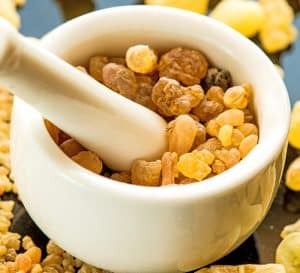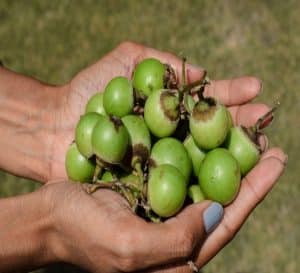
Ever heard of Lasoda fruit? It is one of the lesser-known fruits of India with extraordinary medicinal properties. Lasoda in English is known as Glueberry , it grows primarily in Gujarat and Rajasthan. Lasoda is also called Nisori, Gondi, and Indian cherry in many parts of the country and is scientifically termed Cordia myxa.
According to Ayurveda, this plant has powerful benefits in treating asthma, cough, fever, skin allergies, and a whole host of physical problems.
Let’s know more about the benefits of Lasoda that make it a healthy addition to your diet.
Nutritional value of Lasoda fruit
Here’s the nutritional value of 100g of Lasoda fruit. [1]
| Name | Amount |
| Calories | 65 kcal |
| Protein | 1.8-2g |
| Fat | 1g |
| Carbohydrates | 12.2g |
| Potassium | 1.66g |
| Fibre | 0.3g |
Consumption and Benefits
The Lasoda fruit is consumed in diverse ways, including pickles, churan, and greens. Apart from the fruit it bears, the Cordia myxa tree’s bark and leaves are also widely used in several Ayurvedic medicines. This plant has powerful benefits when it comes to treating asthma, cough, fever, skin allergies, and a whole host of physical problems.
The treatment of several diseases is hidden in this rare fruit. Mentioned below are 5 reasons to add Lasoda fruit to your regular diet.
Why should you include Lasoda in your diet?
1. Lasoda has powerful anti-inflammatory properties
If you are facing problems such as pain and swelling in the joints, you must prepare a decoction of the tree’s bark and camphor. This decoction can then be massaged on the painful or swollen part of the body twice daily – in the morning and evening. Besides this, you may successfully grind the Lasoda tree’s bark into a smooth paste, which can be applied on the inflamed region. This can benefit you to a great extent.
2. It helps relieve sore throat
If you have a cough or sore throat, then preparing and consuming a decoction involving the Lasoda fruit can be of tremendous help. To prepare such a decoction, you may boil the fruit in water and consume it. In addition, the Lasoda tree’s bark can also be successfully boiled in water, filtered, and then consumed. If you do develop a sore throat, this decoction can go a long way in offering you phenomenal relief.
3. It helps combat skin allergies
The seeds of the Lasoda fruit are extremely efficacious when it comes to combatting problems such as itching, scabies, and ringworm. To obtain a smooth paste, you need to grind the seeds very well. You may then apply the paste to the region of the body that itches. Since ancient times, this fruit has been used for its medicinal properties, and the practice continues until this day when it comes to Ayurveda.
4. It helps improve the strength of the body
Besides being a rich source of protein, the Lasoda fruit is also rich in carbohydrates, fiber, calcium, phosphorus, and iron. All these nutrients are needed by the body if it must function at its optimum. Many individuals enjoy eating the fruit raw. However, its dried form is also extremely popular. Several households prepare Laddoos by drying the fruit and eventually mixing it with a wide range of other ingredients. Thus, the Lasoda fruit strengthens the body and provides enough energy to stay active throughout the day. Moreover, incorporating Lasoda greens into your diet is a good way of ensuring that you derive all the nutrients that this plant has to offer.
5. It eases menstrual pain and toothache
Lasoda fruit benefits are many. Besides causing mood swings, women experience period cramps during their menstruation days. Consuming Lasoda during this phase can help in getting rid of period pain. Prepare a decoction involving the bark and consume it. You need to note that consuming such a decoction once or twice during your menstrual cycle will offer much-needed relief. What’s more, when you are confronted with a toothache, you can prepare a decoction by boiling the bark of the tree in water. You can then use this decoction to rinse your mouth.
How to eat Lasoda?
The lasoda fruit benefits are immense and it is consumed in diverse ways, including pickles, Churna, and greens. Apart from the fruit it bears, the Cordia myxa tree’s bark and leaves are also widely used in several Ayurvedic medicines.
Lasoda side effects
Lasoda fruit is generally safe for consumption when used in moderation and as part of a balanced diet. However, like any other substance, it may cause the following side effects in certain individuals.
1. Allergic reactions
Some people may be allergic to Lasoda. Allergic reactions can arise as itching, hives, or swelling. If you experience these symptoms after consuming Lasoda, it is crucial to seek immediate medical attention.
2. Gastrointestinal distress
Lasoda fruit, like many other fruits and vegetables, contains fiber. While fiber is beneficial for digestion, excessive consumption can lead to bloating, gas, and diarrhea. It is advisable to introduce lasoda gradually into the diet to allow the digestive system to adjust.
3. Blood sugar levels
Lasoda may affect blood sugar levels in individuals with diabetes. It is suitable for people with diabetes to monitor their blood sugar levels and consult with their healthcare provider for guidance.
4. Oxalate content
Lasoda fruit contains oxalates, compounds that can contribute to the formation of kidney stones in susceptible individuals. Individuals with a history of kidney stones may need to moderate their intake of foods high in oxalates, including Lasoda.
5. Culinary considerations
Improperly prepared Lasoda, especially if consumed raw, may cause an itchy sensation in the mouth and throat. Cooking or processing Lasoda properly can help mitigate this issue.
FAQs
1. What is Lasoda?
Lasoda is a fruit-bearing tree known for its botanical name, Cordia myxa. It produces small, round fruits that are commonly used in traditional medicine and culinary applications in various regions. [1]
2. What are the common names of Lasoda fruit?
The common names for the fruit of the lasoda include Indian cherry, snotty gobbles, fragrant manjack, and glue berry.
3. What are the benefits of the Lasoda fruit?
Lasoda fruit is rich in nutrients and has several medicinal properties. It contains a higher amount of carbohydrates, proteins, fats, and dietary fiber, making it a valuable source of nutrition. Additionally, it is used in traditional medicine for its potential health benefits, including digestive and anti-inflammatory properties. [1]
The Final Word
Lasoda fruit offers umpteen benefits to the body. From relieving menstrual pain to improving the strength of the body, the diverse range of lasoda fruit benefits and uses make this fruit an essential addition to your daily diet.
Disclaimer:
This article is from a health and wellness perspective only and does not constitute medical advice. Kindly seek the help of a trained medical practitioner before initiating any treatment.





















1 Comments